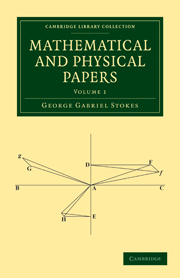Book contents
- Frontmatter
- PREFACE
- Contents
- On the Steady Motion of Incompressible Fluids
- On some cases of Fluid Motion
- On the Motion of a Piston and of the Air in a Cylinder
- On the Theories of the Internal Friction of Fluids in Motion, and of the Equilibrium and Motion of Elastic Solids
- On the Proof of the Proposition that (Mx + Ny)-1 is an Integrating Factor of the Homogeneous Differential Equation M+N dy/dx = 0
- On the Aberration of Light
- On Fresnel's Theory of the Aberration of Light
- On a Formula for determining the Optical Constants of Doubly Refracting Crystals
- On the Constitution of the Luminiferous Ether, viewed with reference to the Aberration of Light
- Report on Recent Researches on Hydrodynamics
- Supplement to a Memoir on some cases of Fluid Motion
- On the Theory of Oscillatory Waves
- On the Resistance of a Fluid to two Oscillating Spheres
- On the Critical Values of the Sums of Periodic Series
- Supplement to a paper on the Theory of Oscillatory Waves
- Index
On the Theory of Oscillatory Waves
Published online by Cambridge University Press: 07 September 2010
- Frontmatter
- PREFACE
- Contents
- On the Steady Motion of Incompressible Fluids
- On some cases of Fluid Motion
- On the Motion of a Piston and of the Air in a Cylinder
- On the Theories of the Internal Friction of Fluids in Motion, and of the Equilibrium and Motion of Elastic Solids
- On the Proof of the Proposition that (Mx + Ny)-1 is an Integrating Factor of the Homogeneous Differential Equation M+N dy/dx = 0
- On the Aberration of Light
- On Fresnel's Theory of the Aberration of Light
- On a Formula for determining the Optical Constants of Doubly Refracting Crystals
- On the Constitution of the Luminiferous Ether, viewed with reference to the Aberration of Light
- Report on Recent Researches on Hydrodynamics
- Supplement to a Memoir on some cases of Fluid Motion
- On the Theory of Oscillatory Waves
- On the Resistance of a Fluid to two Oscillating Spheres
- On the Critical Values of the Sums of Periodic Series
- Supplement to a paper on the Theory of Oscillatory Waves
- Index
Summary
In the Report of the Fourteenth Meeting of the British Association for the Advancement of Science it is stated by Mr Russell, as a result of his experiments, that the velocity of propagation of a series of oscillatory waves does not depend on the height of the waves. A series of oscillatory waves, such as that observed by Mr Russell, does not exactly agree with what it is most convenient, as regards theory, to take as the type of oscillatory waves. The extreme waves of such a series partake in some measure of the character of solitary waves, and their height decreases as they proceed. In fact it will presently appear that it is only an indefinite series of waves which possesses the property of being propagated with a uniform velocity, and without change of form: at least this is the case when the waves are such as can be propagated along the surface of a fluid which was previously at rest. The middle waves, however, of a series such as that observed by Mr Russell agree very nearly with oscillatory waves of the standard form. Consequently, the velocity of propagation determined by the observation of a number of waves, according to Mr Russell's method, rmist be very nearly the same as the velocity of propagation of a series of oscillatory waves of the standard form, and whose length is equal to the mean length of the waves observed, which are supposed to differ from each other but slightly in length.
Information
- Type
- Chapter
- Information
- Mathematical and Physical Papers , pp. 197 - 229Publisher: Cambridge University PressPrint publication year: 2009First published in: 1880
Accessibility standard: Unknown
Why this information is here
This section outlines the accessibility features of this content - including support for screen readers, full keyboard navigation and high-contrast display options. This may not be relevant for you.Accessibility Information
- 77
- Cited by
